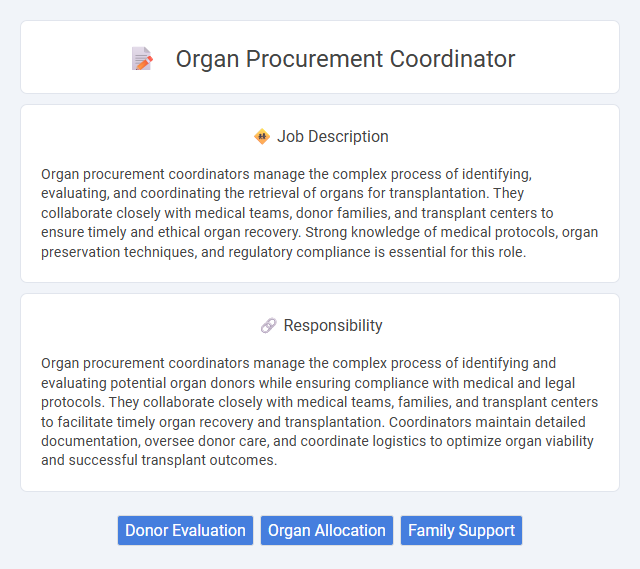
Organ procurement coordinators manage the complex process of identifying, evaluating, and coordinating the retrieval of organs for transplantation. They collaborate closely with medical teams, donor families, and transplant centers to ensure timely and ethical organ recovery. Strong knowledge of medical protocols, organ preservation techniques, and regulatory compliance is essential for this role.
People who possess strong emotional resilience and excellent communication skills are likely suitable for a career as an organ procurement coordinator. Those comfortable working in high-pressure environments and handling sensitive situations with compassion probably find this role fulfilling. Individuals who struggle with emotional stress or prefer less interpersonal interaction may not be ideal candidates for this position.
Qualification
Organ procurement coordinators typically require a bachelor's degree in nursing, health science, or a related field, with many employers preferring candidates who hold a registered nurse (RN) license. Certification such as Certified Procurement Transplant Coordinator (CPTC) from the American Board for Transplant Certification enhances job prospects and demonstrates specialized expertise. Strong communication skills, critical thinking, and knowledge of organ donation laws and ethical standards are essential qualifications for success in this role.
Responsibility
Organ procurement coordinators manage the complex process of identifying and evaluating potential organ donors while ensuring compliance with medical and legal protocols. They collaborate closely with medical teams, families, and transplant centers to facilitate timely organ recovery and transplantation. Coordinators maintain detailed documentation, oversee donor care, and coordinate logistics to optimize organ viability and successful transplant outcomes.
Benefit
Working as an organ procurement coordinator likely offers a unique opportunity to make a profound impact on patients' lives by facilitating life-saving transplants. The position probably provides emotional rewards alongside competitive salaries and comprehensive benefits, including health insurance and retirement plans. There may also be chances for professional growth and specialized training within the healthcare sector.
Challenge
Organ procurement coordinator roles likely involve managing complex logistical challenges and navigating emotional stress in high-pressure environments. The job probably requires coordinating with multiple medical teams and family members, which may complicate timely organ retrieval. Balancing ethical considerations and strict regulatory compliance might also present significant ongoing difficulties.
Career Advancement
Organ procurement coordinators play a critical role in managing the complex process of donor evaluation, family communication, and organ allocation to ensure successful transplant outcomes. Career advancement opportunities include specialized roles such as transplant program managers, clinical transplant coordinators, and leadership positions within organ procurement organizations (OPOs). Professional development through certifications like Certified Procurement Transplant Coordinator (CPTC) and experience in regulatory compliance enhance prospects for higher responsibility and salary growth in this healthcare niche.
Key Terms
Donor Evaluation
Organ procurement coordinators play a critical role in donor evaluation by assessing medical histories, conducting physical examinations, and reviewing laboratory results to determine donor eligibility. They collaborate with medical teams to ensure donors meet strict criteria for organ viability and safety, facilitating timely decision-making. This evaluation process directly impacts the quality and success of organ transplantation outcomes.
Organ Allocation
Organ procurement coordinators manage the critical process of organ allocation by ensuring that donated organs are distributed efficiently and ethically to match recipients based on medical urgency, compatibility, and geographic location. They coordinate with transplant centers, tissue typing laboratories, and donor families to optimize organ placement while adhering to established protocols and regulatory standards. Their expertise is essential in maximizing successful transplant outcomes and reducing waitlist mortality.
Family Support
Organ procurement coordinators play a critical role in providing compassionate family support during the organ donation process. They deliver clear, empathetic communication to help families understand the medical, legal, and emotional aspects involved, ensuring informed consent is obtained respectfully. Coordinators also offer continuous emotional support and resources, helping families navigate the decision-making process during a challenging time.
 kuljobs.com
kuljobs.com